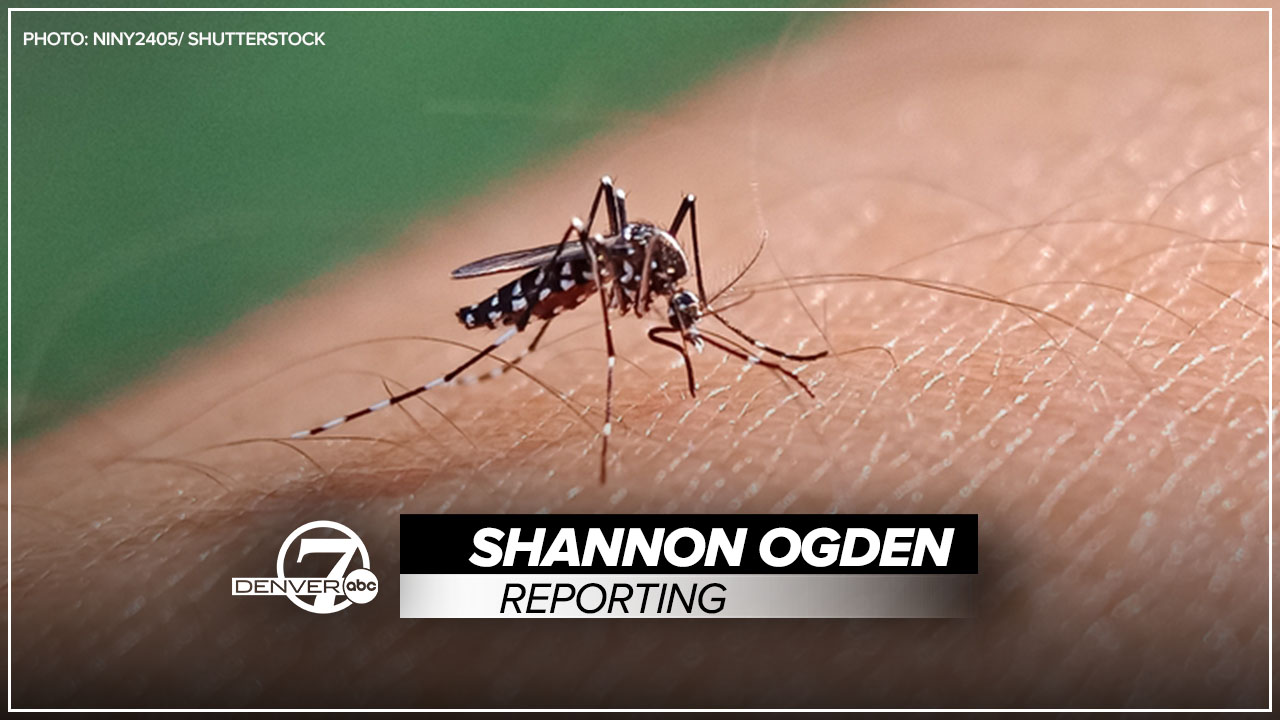DENVER — Health officials in Denver and Jefferson County on Monday urged residents to take precautions around mosquitoes after confirming the first cases of West Nile virus in their jurisdictions this week.
In Denver, a 55-year-old patient is recovering at home after experiencing neurologic disease following a mosquito bite, said Grace Nelson, the Denver Department of Public Health and Environment's (DDPHE) disease intervention unit supervisor.
Jefferson County Public Health (JCPHE) officials said three residents there were also recovering at home following an encounter with the mosquito-borne illness.
While most people infected with West Nile don’t experience symptoms, people aged 55 and up, those with immunocompromised systems, or people with chronic health conditions are most at risk, according to health experts Denver7 has spoken with over the past week.
Common symptoms of West Nile virus include fever, fatigue, headaches, and body aches, with some people also experiencing rashes or swollen lymph nodes which typically develop three to 14 days after a mosquito bite, DDPHE officials said.
Complications can arise in about 1% of those infected, who can go on to develop a serious, sometimes fatal, neuroinvasive disease that can cause encephalitis and/or meningitis, loss of vision, paralysis, coma, tremors, convulsions, and even death, according to health officials.
DDPHE officials said those severe infections will begin suddenly and can include symptoms of high fever and headache, neck stiffness, disorientation, and tremors. People should talk to their doctor or health care provider if they start to develop any of these symptoms following a mosquito bite.
- Denver7 has been keeping you informed about West Nile in Colorado this year. As part of our reporting, we reached out to communities across the Denver metro to learn how they are limiting the spread of the virus. You can watch that story in the video player below:
So far this year, 11 people have been infected with West Nile, with 5 experiencing neurologic symptoms and 3 others requiring hospitalization. A Lafayette adult died from the disease last month, according to state health officials.
Data from the state health department shows West Nile season typically begins around mid-July and peaks about a month later, but state health officials said cases can be identified as early as May and as late as December, with the state’s first freeze usually signaling the end of the season.
While there is no treatment, cure, or vaccine to protect against West Nile virus, medical professionals can treat symptoms to help patients feel better and possibly recover more quickly, according to Denver health officials.
Mosquitoes are most active at dusk and dawn, so the first line of defense against potential exposure is to avoid activities during this time, according to health experts.
As mosquito season continues, health officials recommend taking the following steps to protect yourself and your family from West Nile virus:
- Eliminate sources of standing water near your home by emptying, scrubbing, turning over, covering or throwing out items that hold water such as tires, buckets, planters, toys, wheelbarrows, pools, birdbaths, flowerpots, or trash containers once a week. All of these can become a breeding ground for the mosquitoes that carry West Nile virus
- Check for water-holding containers both indoors and outdoors
- Avoid watering cement or on the street, as these can result in pools that support larval mosquitoes
- If making landscape decisions, consider ways to minimize overspray (of irrigation) to streets and gutters
- Wear long pants, long-sleeved shirts, and socks in areas where mosquitoes are active
- Use an insect repellent containing DEET, picaridin, oil of lemon eucalyptus, or para-menthane-diol. The EPA has a database where you can search for and find a repellent that is right for you.
In addition to eliminating sources of standing water around your home weekly, you can also mosquito-proof your home by installing or repairing screens on windows and doors, health officials said.





Denver7 is committed to making a difference in our community by standing up for what's right, listening, lending a helping hand and following through on promises. See that work in action, in the videos above.








